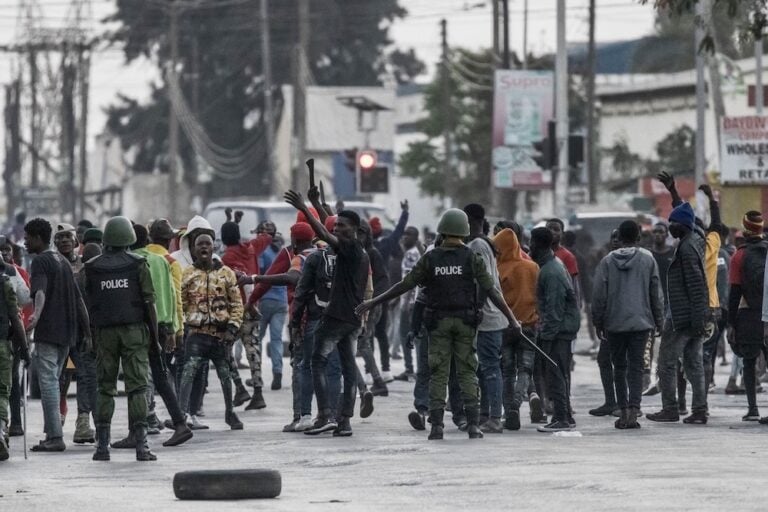(MISA/IFEX) – The Zambian High Court last week fined the inspector general of police, Francis Ndhlovu, one million kwacha (US$400) for failing to appear at a hearing in which he is being sued by the independent “Post” newspaper. Ndhlovu failed to appear without providing any explanation, prompting the conviction. **Updates IFEX alert of 10 June […]
(MISA/IFEX) – The Zambian High Court last week fined the inspector general
of police, Francis Ndhlovu, one million kwacha (US$400) for failing to
appear at a hearing in which he is being sued by the independent “Post”
newspaper. Ndhlovu failed to appear without providing any explanation,
prompting the conviction.
**Updates IFEX alert of 10 June 1998**
Background Information
Ndhlovu, along with the state-owned Zambia Telecommunications Company
(ZAMTEL) and the Zambian Attorney General, have been cited as respondents in
a civil suit initiated by the editor-in-chief of the “Post”, Fred M’membe.
The civil action stems from the alleged illegal tapping of the “Post”
newspaper’s telephones two years ago.
In his petition to the High Court filed on 9 June 1998, M’membe, in his own
capacity and on behalf of the “Post” newspaper, said ZAMTEL allowed a chief
inspector Mubeshi of the Zambian police to tap the phones used by the “Post”
between 15 and 24 May 1996, without their permission and in contravention of
the
Zambia Telecommunications Act. This happened at the height of a bombing
campaign by a shadowy group called the “Black Mamba”.
The petition said further that during the treason trial of the suspected
“Black Mamba” masterminds, Ndhlovu admitted in court that he had ordered the
tapping of the phones used by the “Post”. But the Zambia Telecommunications
Act did not give the inspector general of police the authority to order the
tapping of anyone’s phones.
M’membe contends that the action by ZAMTEL to allow the phone tapping was an
infringement of his fundamental rights and freedoms of privacy and freedom
of expression as guaranteed in the Zambian constitution, and as a result,
there had been a marked decline in the number of people giving the “Post”
newspaper “scoops”.
M’membe has asked the court to declare the actions of ZAMTEL
unconstitutional, to prosecute ZAMTEL, to issue an injunction restraining
ZAMTEL from further phone tapping, to award exemplary and ordinary damages
to him and the “Post” for the infringement, and to order ZAMTEL to pay the
costs of the law suit.
The attorney general has been included in his capacity as the government’s
chief legal representative.
government’s downfall. He was addressing a workshop
in the capital, Harare, called to work out ways the ministry of information
can fight back.
Background Information
Chavunduka and Choto were held over a story in their paper on 10 January
alleging a coup plot in Zimbabwe. The government says there was no such plot
and has charged them with publishing a false story likely to cause alarm and
despondency.
Chavunduka was arrested by the military on 12 January. Choto was arrested by
police on 19 January, and handed over to the military for interrogation.
Both men say they were tortured by the military and state security agents in
an underground chamber near Harare, where they were severely beaten,
suffocated in water and had electric shocks applied to their genitals.
The Defence Minister has denied the torture charges, branding them lies.
But several governments, including the United States of America, Britain and
Norway, along with scores of local and international human rights bodies,
have asked the authorities to promptly investigate the claims and bring the
culprits to book. Chavunduka and Choto have yet to report for work because
they are still recuperating from their ordeal.
Both men have been charged under the Law and Order Maintenance Act of 1960
for publishing false reports that were “likely to cause alarm, fear or
despondency to the public, or section thereof.” The offence carries with it
a maximum prison sentence of seven years. They were released on 21 January
on bail of Zim$10,000 (approx. US$255). They were not asked to plead and
were remanded to appear for trial on 22 February. They were also instructed
to surrender their travel documents.
On 22 January, the day after their release, police arrested the managing
director of “The Standard”, Clive Wilson, and held him in jail for three
nights. Wilson was released unconditionally on 23 January after the Attorney
General refused to prosecute him for what he said was the police’s lack of
evidence.
Speaking to reporters afterwards, Wilson said he was interrogated for three
and a half hours concerning the sources of the contentious story which
appeared in “The Standard”, but that he was not tortured in any way.
Recommended Action
Send appeals to authorities:
association and assembly
the two journalists and for those responsible to be brought to book
violation
of the right to freedom of expression as contained in Article 19 of the
International Covenant on Civil and Political Rights and Article 9 of the
African Charter on Human and Peoples’ Rights, of which Zimbabwe is a
signatory
Appeals To
His Excellency President Robert Mugabe
Office of the President
Causeway, Harare
Zimbabwe
Fax: +263 4 708 557Mr Moven Mahachi
Zimbabwe Minister of Defence
Fax: +263 4 796 762
Please copy appeals to the source if possible.
For further information, contact Bright Mwape or Raashied Galant at MISA,
Street Address: 21 Johann Albrecht Street, Mailing Address; Private Bag
13386 Windhoek, Namibia, tel: +264 61 232975, fax: +264 61 248016, e-mail:
bright@ingrid.misa.org.na, research@ingrid.misa.org.na, Internet:
http://www.misanet.org/.


